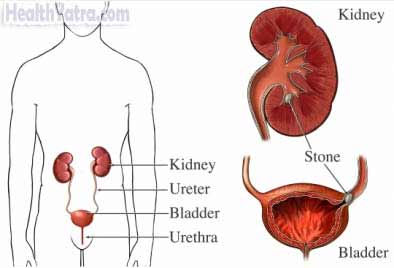Definition
Acute renal failure is the sudden loss of kidney function. Kidneys clean waste from the blood and manage the balance of fluid in the body. The condition can be reversed with timely medical intervention, such as dialysis, which is a process that cleans the blood.

Causes
There are many possible causes of sudden kidney failure because there are three anatomical sites for problems to occur in the renal system: before the blood enters the kidneys, within the kidney , and after the urine is processed by the kidney and enters the ureters.
Sudden kidney failure can result from problems with blood flow to the kidney, which can be caused by blood loss or dehydration. It can also result from conditions such asinfections that interfere with the work of the kidney.
The most common cause of sudden kidney failure occurs inside the kidney. Acute tubular necrosis is the death of the cells inside the kidney that act as the blood’s filter. These cells die when they are deprived of oxygen. This can be due to surgical complications or the side effects of certain medicines. Physical problems, such as swollen prostate glands or kidney stones can also cause sudden kidney failure.
Risk Factors
A risk factor is something that increases your chance of getting a disease or condition.
The following factors increase your chance of developing acute renal failure. If you have any of these risk factors, tell your doctor:
- Having a chronic disease, such as diabetes, kidney disease, heart disease ( eg,congestive heart failure), liver disease, or high blood pressure
- Increased age
- Dehydration
- Bleeding, especially from the gastrointestinal tract
- Certain medications are potentially toxic to the kidney—for example, antibiotics such as sulfa drugs, chemotherapeutic drugs, radiocontrast material, and illegal drugs (eg, heroin)
- Complications following surgeries or care in an intensive care unit (ICU)
- Overuse of certain over-the-counter painkillers known as nonsteroidal anti-inflammatory drugs (NSAIDS)—for example, ibuprofen, naproxen sodium, and ketoprofen
- Use of angiotensin converting enzyme (ACE) inhibitors
- Obstructive causes (eg, benign prostatic hypertrophy, bladder tumor)
Symptoms
Many people do not have any symptoms, but symptoms can include the following:
- Swelling throughout the body
- Less frequent urination
- Dark-colored urine
- Tiredness
- Confusion
- Nausea or vomiting
- Muscle weakness or muscle cramps
- No appetite
- Metallic taste
- In severe cases, coma or seizures
Diagnosis
You may be referred to a kidney specialist (nephrologist) for diagnosis and treatment. Your doctors will ask about your symptoms and medical history. A physical exam will be done. Your doctor will ask about any medications you are taking. You will have blood and/or urine tests to look for signs of kidney failure, including abnormal levels of electrolytes, blood urea, nitrogen (BUN), creatinine (an acid that promotes muscle growth), and red blood cells.
The amount of urine produced over several hours can also be considered for diagnosis, since kidney failure affects urine production. Urine will also be examined for color and any unusual content that might indicate infection. The nephrologist may also require a kidney ultrasound, CT scan, MRI, or even an examination of the bladder for stones.
Treatment
The treatment for acute renal failure will depend on the exact cause and severity of the event. Your doctor may recommend any of the following:
- Undergoing dialysis
- Treating obstruction with a catheter or stent
- Maintaining adequate blood volume with fluids given by IV
- Stopping medications or drugs that caused the loss of function
- Treating related problems, such as kidney stones or infections
- Incorporating a diet with limited protein intake, supervised by a physician
Prevention
To help reduce your chance of acute kidney failure, take the following steps:
- Get a physical every year that includes a urine test to monitor your kidney’s health.
- Drink water and other fluids to stay hydrated.
- Don’t take drugs or other substances that can damage your kidneys. Check with your doctor to find out about the potential side effects of any medications you are taking.
- People at risk for chronic kidney disease (eg, those with a pre-existing kidney disease or kidney stone) should get more frequent check-ups at their doctor’s office.
Acute Renal Failure Treatment in India – Page Keywords:
Acute Renal Failure Definition, Acute Renal Failure Definition Causes, Acute Renal Failure Symptoms, Acute Renal Failure Treatment in India, Acute Renal Failure Treatment Cost in India, Acute Renal Failure Surgery Cost, Top Acute Renal Failure Treatment Hospital, Top Acute Renal Failure Treatment Doctor in India, Acute Renal Failure Meaning in Marathi, Acute Renal Failure Treatment Near me, Acute Renal Failure Complications, Travel India for Acute Renal Failure Treatment, Acute Renal Failure Treatment in Arab Countries, Acute Renal Failure Treatment in Bangladesh, Acute Renal Failure Treatment in Dhaka, Acute Renal Failure Meaning in Bengali, Acute Renal Failure Meaning in Arabic, Acute Renal Failure Meaning in Hindi, Acute Renal Failure Treatment in Bahrain, Acute Renal Failure Treatment in Egypt, Acute Renal Failure Treatment in Iraq, Acute Renal Failure Treatment in Jordan, Acute Renal Failure Treatment in Kuwait, Acute Renal Failure Treatment in Lebanon, Acute Renal Failure Treatment in Saudi Arabia, Acute Renal Failure Treatment in United Arab Emirates, Acute Renal Failure Treatment in Sudan, Acute Renal Failure Treatment in Tunisia, Acute Renal Failure Treatment in Nepal, Acute Renal Failure Treatment cost,
Acute Renal Failure Treatment Cost in India, Acute Renal Failure Top Doctors Best Hospital in India
